#form poetry
Text

"My Dog Doesn't Know It's My Birthday (You're the Cream in My Coffee)" - a Shakespearean sonnet written 4/25/2024
#2024#it is my birthday#i'm 25#i know! who could figure out that subtext?#poetry#poem#sonnet#iambic pentameter#iambic meter#shakespearean sonnet#english sonnet#form poetry#birthdays#animals#pets#cole porter#you're the cream in my coffee isn't a cole porter song but i do ALWAYS sing it to dickens#i used to sing it to my old dogs sandy and raider when they were alive too#the habit of singing jazz standards to my dogs is one that has outlived my dogs
14 notes
·
View notes
Text
Song of Swords
In shadows dwell the swift and stealthy knights,
Ninjas, masters of darkness and disguise,
A dance of blades beneath the dim moonlight.
Their skills honed will, their movements out of sight,
Mysterious figures with piercing eyes,
In shadows dwell the swift and stealthy knights.
Yet amidst their battles, a strange delight,
A craving that no warrior denies
A dance of blades beneath the dim moonlight.
They seek respite from endless ninja fights,
In humble havens where delight applies,
In shadows dwell the swift and stealthy knights.
A taco's call transcends the martial heights,
Unsheathing swords, they rush to feast on spice,
A dance of blades beneath the dim moonlight.
These warriors, fierce with appetite,
Unmask their hunger, taste buds harmonize,
In shadows dwell the swift and stealthy knights,
A dance of blades beneath the dim moonlight.
© 2023 by Jennifer R.R. Mueller
For @purplemonkeysexgod69, who requested a villanelle about tacos and ninjas.
49 notes
·
View notes
Text
dust motes enraptured
by sun in an empty room-
movement in still life
Prompt: sun in an empty room - @nosebleedclub
#haiku#nosebleedclub prompts#nosebleedclub#poetry#jun 2022#2022 poetry#poemsbyylois#form poetry#[i found a bunch of lil poems in my drafts so i thought i'd share lol]
51 notes
·
View notes
Text
The Heather-brown Riddle
The Three Fates, 1910 is a painting by Alexander Rothaug which was uploaded on November 22nd, 2021.
The Heather-brown Riddle
In a forest glade, the youngest Klotho separates the chaff from wheatEden and Hades all sorts of charred,with soul their name is signed upon a paper sheath.
The forgiveness , the misery, the endless tired fleet,they cut swift her hands, but slightly too hard;In a forest…

View On WordPress
2 notes
·
View notes
Text
19K notes
·
View notes
Text
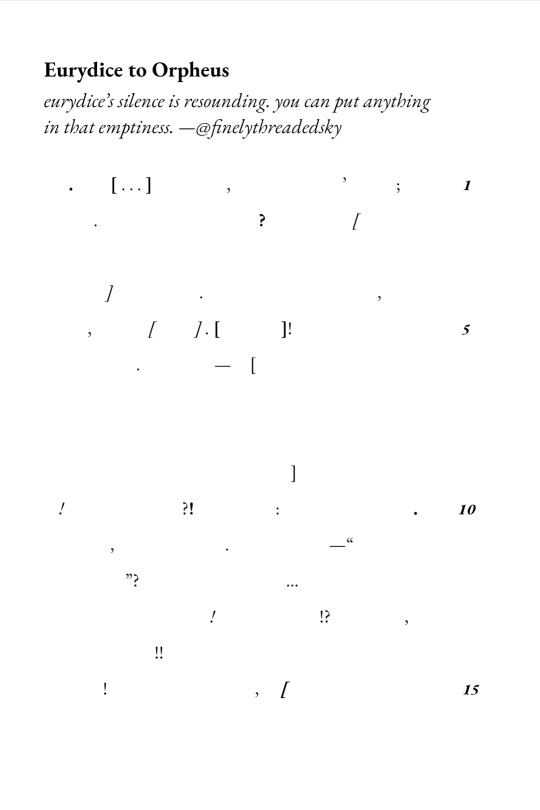
Eurydice to Orpheus • Nov. 2023
eurydice’s silence is resounding. you can put anything in that emptiness. —@finelythreadedsky
#p#composition#< so funny to call this ''''''poetry'''''' that i ''''''composed''''''#this is either my biggest hit yet or my biggest miss ever#what love rendered me in verse?#the box of language desires form but not restraint#archive
9K notes
·
View notes
Text



Just a pair of friendly sorcerers out on a stroll~
#jujutsu kaisen#jjk#sukuna#ryomen sukuna#uraume#jjk sukuna#jjk uraume#true form sukuna#og sukuna#heian era#king of curses#fan art#my art#jjk art#sukuna when he's not out terrorising villagers and sorcerers: I eat drink and sleep#oh and maybe he likes to read stuff? write poetry? too? but today he's gonna sleep like a lazy cat instead#Food tastes better when you're eating it with another person#so i HC Sukuna doesn't mind having Uraume eating along with him#:')
7K notes
·
View notes
Text
reblog for wider reach id appreciate it
#i just really wanna learn about more art forms#pls put in the tags some cool ones#art#artist#artwork#poll#polls#lino#painting#drawing#sculpting#sewing#photography#poetry#writing#poll i made
9K notes
·
View notes
Text

Bryce Emley, from "A List of Waters"
2K notes
·
View notes
Text

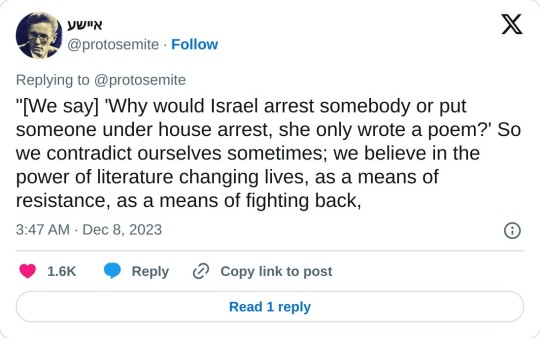
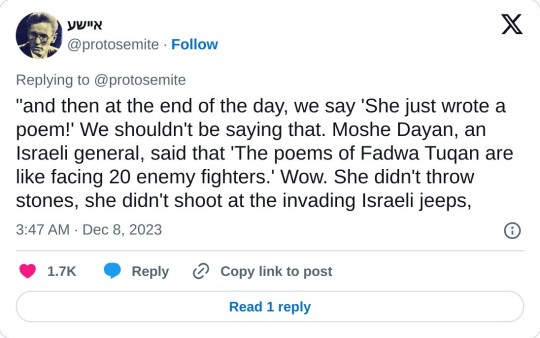
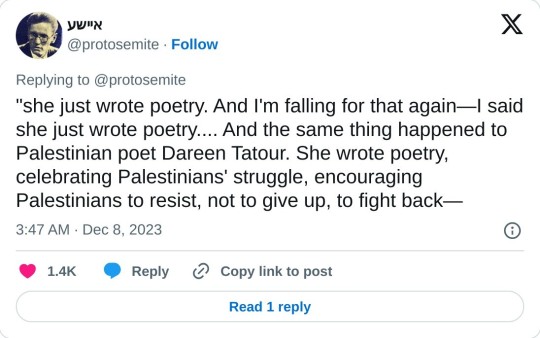




#poetry is an act of resistance#speaking is resistance#dont let anyone make you feel bad for speaking up about Palestine#those who say things like “blogging isnt activism” are afraid of your words more than anything#even a post which is a modern form of communication and incredibly important#is an act of resistance
1K notes
·
View notes
Text
None Of You Know What Haiku Are
I'm going to preface this by saying that i am not an expert in ANY form of poetry, just an enthusiast. Also, this post is... really long. Too long? Definitely too long. Whoops! I love poetry.
If you ask most English-speaking people (or haiku-bot) what a haiku is, they would probably say that it's a form of poetry that has 3 lines, with 5, and then 7, and then 5 syllables in them. That's certainly what I was taught in school when we did our scant poetry unit, but since... idk elementary school when I learned that, I've learned that that's actually a pretty inaccurate definition of haiku. And I think that inaccurate definition is a big part of why most people (myself included until relatively recently!) think that haiku are kind of... dumb? unimpressive? simple and boring? I mean, if you can just put any words with the right number of syllables into 3 lines, what makes it special?
Well, let me get into why the 5-7-5 understanding of haiku is wrong, and also what makes haiku so special (with examples)!
First of all, Japanese doesn't have syllables! There's a few different names for what phonetic units actually make up the language- In Japanese, they're called "On" (音), which translates to "sound", although English-language linguists often call it a "mora" (μ), which (quoting from Wikipedia here) "is a basic timing unit in the phonology of some spoken languages, equal to or shorter than a syllable." (x) "Oh" is one syllable, and also one mora, whereas "Oi" has one syllable, but two moras. "Ba" has one mora, "Baa" has two moras, etc. In English, we would say that a haiku is made up of three lines, with 5-7-5 syllables in them, 17 syllables total. In Japanese, that would be 17 sounds.
For an example of the difference, the word "haiku", in English, has 2 syllables (hai-ku), but in Japanese, はいく has 3 sounds (ha-i-ku). "Christmas" has 2 syllables, but in Japanese, "クリスマス" (ku-ri-su-ma-su) is 5 sounds! that's a while line on its own! Sometimes the syllables are the same as the sounds ("sushi" is two syllables, and すし is two sounds), but sometimes they're very different.
In addition, words in Japanese are frequently longer than their English equivalents. For example, the word "cuckoo" in Japanese is "ほととぎす" (hototogisu).
Now, I'm sure you're all very impressed at how I can use an English to Japanese dictionary (thank you, my mother is proud), but what does any of this matter? So two languages are different. How does that impact our understanding of haiku?
Well, if you think about the fact that Japanese words are frequently longer than English words, AND that Japanese counts sounds and not syllables, you can see how, "based purely on a 17-syllable counting method, a poet writing in English could easily slip in enough words for two haiku in Japanese” (quote from Grit, Grace, and Gold: Haiku Celebrating the Sports of Summer by Kit Pancoast Nagamura). If you're writing a poem using 17 English syllables, you are writing significantly more content than is in an authentic Japanese haiku.
(Also not all Japanese haiku are 17 sounds at all. It's really more of a guideline.)
Focusing on the 5-7-5 form leads to ignoring other strategies/common conventions of haiku, which personally, I think are more interesting! Two of the big ones are kigo, a season word, and kireji, a cutting word.
Kigo are words/phrases/images associated with a particular season, like snow for winter, or cherry blossoms for spring. In Japan, they actually publish reference books of kigo called saijiki, which is basically like a dictionary or almanac of kigo, describing the meaning, providing a list of related words, and some haiku that use that kigo. Using a a particular kigo both grounds the haiku in a particular time, but also alludes to other haiku that have used the same one.
Kireji is a thing that doesn't easily translate to English, but it's almost like a spoken piece of punctuation, separating the haiku into two parts/images that resonate with and add depth to each other. Some examples of kireji would be "ya", "keri", and "kana." Here's kireji in action in one of the most famous haiku:
古池や 蛙飛び込む 水の音
(Furu ike ya kawazu tobikomu mizu no oto)
(The old pond —
A frog jumps in
The sound of the water.)
You can see the kireji at the end of the first line- 古池や literally translates to "old pond ya". The "ya" doesn't have linguistic meaning, but it denotes the separation between the two focuses of the haiku. First, we are picturing a pond. It's old, mature. The water is still. And then there's a frog! It's spring and he's fresh and new to the world! He jumps into the pond and goes "splash"! Wowie! When I say "cutting word", instead of say, a knife cutting, I like to imagine a film cut. The camera shows the pond, and then it cuts to the frog who jumps in.
English doesn't really have a version of this, at least not one that's spoken, but in English language haiku, people will frequently use a dash or an ellipses to fill the same role.
Format aside, there are also some conventions of the actual content, too. They frequently focus on nature, and are generally use direct language without metaphor. They use concrete images without judgement or analysis, inviting the reader to step into their shoes and imagine how they'd feel in the situation. It's not about describing how you feel, so much as it's about describing what made you feel.
Now, let's put it all together, looking at a haiku written Yosa Buson around 1760 (translated by Harold G. Henderson)
The piercing chill I feel:
my dead wife's comb, in our bedroom,
under my heel
We've got our kigo with "the piercing chill." We read that, and we imagine it's probably winter. It's cold, and the kind of cold wind that cuts through you. There's our kireji- this translation uses a colon to differentiate our two images: the piercing chill, and the poet stepping on his dead wife's comb. There's no descriptions of what the poet is feeling, but you can imagine stepping into his shoes. You can imagine the pain he's experiencing in that moment on your own.
"But tumblr user corvidcall!" I hear you say, "All the examples you've used so far are Japanese haiku that have been translated! Are you implying that it's impossible for a good haiku to be written in English?" NO!!!!! I love English haiku! Here's a good example, which won first place in the 2000 Henderson haiku contest, sponsored by the Haiku Society of America:
meteor shower . . .
a gentle wave
wets our sandals
When you read this one, can you imagine being in the poet's place? Do you feel the surprise as the tide comes in? Do you feel the summer-ness of the moment? Haiku are about describing things with the senses, and how you take in the world around you. In a way, it's like the poet is only setting a scene, which you inhabit and fill with meaning based on your own experiences. You and I are imagining different beaches, different waves, different people that make up the "our" it mentioned.
"Do I HAVE to include all these things when I write haiku? If I include all these things, does that mean my haiku will be good?" I mean, I don't know. What colors make up a good painting? What scenes make up a good play? It's a creative medium, and nobody can really tell you you can't experiment with form. Certainly not me! But I think it's important to know what the conventions of the form are, so you can appreciate good examples of it, and so you can know what you're actually experimenting with. And I mean... I'm not the poetry cops. But if you're not interested in engaging with the actual conventions and limitations of the form, then why are you even using that form?
I'll leave you with one more English language haiku, which is probably my favorite haiku ever. It was written by Tom Bierovic, and won first place at the 2021 Haiku Society of America Haiku Awards
a year at most . . .
we pretend to watch
the hummingbirds
Sources: (x) (x) (x) (x) (x) (x)
Further reading:
Forms in English Haiku by Keiko Imaoka
Haiku: A Whole Lot More Than 5-7-5 by Jack
How to Write a Bad Haiku by KrisL
Haiku Are Not a Joke: A Plea from a Poet Who Has Had It Up to Here by Sandra Simpson
Haiku Checklist by Katherine Raine
#poetry#haiku#writing#literature#anime life#long post#i want to apologize but i had to get something off my chest#and the thing was. i love haiku#and when i see posts on here about haiku. i get so angy.#well ok i really get more disappointed bc nobody is really engaging with the form on its own terms#anyway i hope you enjoy some of my favorite haiku because theyre in there!!!!!#i didnt really get into the history of haiku. and i also did not get into why i got really into it#but i will say that i was really inspired by Jacob Geller's video A Thousand Ways of Seeing a Forest#which is a lot about translation#(which i mean. as an interpreter AND a poetry-enjoyer. really appealed to me lol)
10K notes
·
View notes
Text
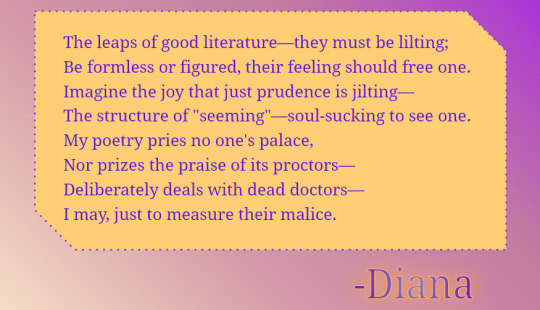
"Leaps of Good Literature" - an octave written 8/26/2023
#i took the form of this stanza from the york mystery plays cycle#the barkers play the fall of the angels specifically#we love medieval poetry and verse plays on this blog#2023#rhyme scheme#poem#poetry#medieval poetry#(for the rhyme scheme)#form poetry#poets on tumblr#feminine rhymes#amphibrachic meter#amphibrachic tetrameter#amphibrachic trimeter#octave
5 notes
·
View notes
Text
okay hold on this is so cool. bear with me
1) read this terrance hayes poem
2) read this gwendolyn brooks poem
3) go back to the terrance hayes poem and pay attention to the ends of lines
#terrance hayes is a GENIUSSSS#like he created a whole new poetic form with this how insanely cool is that?#poetry#terrance hayes#gwendolyn brooks
968 notes
·
View notes
Text

My heart almost broke. I mean, of course I and others can/could ship whatever anyway, but I can't help but be relieved that Sidon and Yona's marriage was arranged by his father canonically.
#tears of the kingdom#legend of Zelda tears of the kingdom#totk#totk spoilers#tears of the kingdom spoilers#sidlink#sidon#link#I have no problem with Yona#she seems really sweet and I like how they showcased her personality#but I just love sidlink and Sidon still waxes poetry about Link#not to mention calling his sage pledge a vow while getting down on one knee to hold Link's hand and forming the ring#yes yes I know the others technically give rings but THE DELIVERY MATTERS#I'll shut up now
2K notes
·
View notes
Text
The Golden Riddle
The Golden Riddle
Who ever wanted to grieve here?Paid for the dirt and the shovel and grave.Eurydice watches as Orpheus leaves.
Given peanuts, every audience will cheer!Chant “How Sullen!” “How ferocious, oh how brave!”Who ever wanted to grieve here?
I dreamt of headlights ever since a baby deer,their voices that bewitch your fears to waves;Eurydice watches as Orpheus leaves.
The un-apointed…

View On WordPress
#creative writing#creativity#digital art#emotions#Eurydice#form poetry#greek mythology#love#Orpheus#poetry#spilled ink#villanelle
1 note
·
View note
Text
do any of my friends know the love I carry in every word i say to them. When I add too many words, drag on a joke that’s over, when I message them despite the fact the conversation barely ended five minutes ago? every word i speak is an intimacy that’s laced with outright adoration for them as people and all the little details that make them who they are. Do you know I love you? Do y’all know how much of you I try to commit to memory? How much I try to make you smile? do y’all know the love I feel for you?
#ignore this I am just being philosophical and queer#very exhausted and overcome with human emotion#the human experience as pack animals is so fascinating#also fucked up friend emotions bc I’m aroace#and friendships mean so much to me#i am so sleepy#aromantic#asexual#aspec#asexuality#aromantism#queer platonic love#platonic love#i love you#friendship#late night emotions#alterous yearning#shouting into the void#free form poetry#poem
407 notes
·
View notes